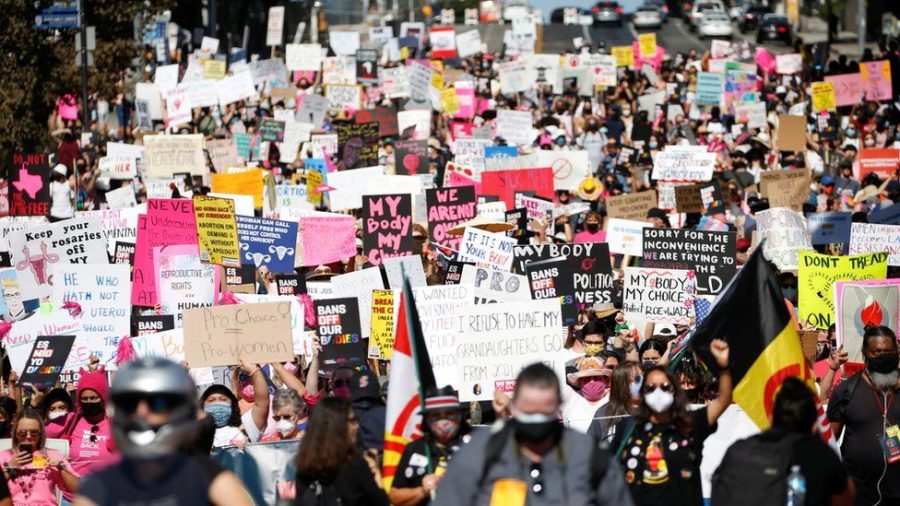Roe v. Wade Needs to be Talked About
March 8, 2023
Roe v. Wade was a landmark supreme court decision, ruling that the choice to have an abortion was protected by the The Constitution of the United States. Last June, the news that Roe v. Wade was overturned shook the US and sparked protests across the country. Thirteen states have now criminalized abortion. Literal children as young as 10 have been denied abortions because of where they live. Not to mention the financial consequences, people of color being disproportionately affected, and the generational implications.
Why don’t we talk about this in school? Maybe it’s the recency, the controversy, or the stigma around abortion. But young women in America, all young people with a uterus see progress being stripped away like this and it sends a message: That, even in a life threatening situation, we have less medical rights than men. That our reproduction is what’s most important about our humanity. It’s a lot to face as a young adult. Some of us feel less safe, and even wonder what would happen in the nightmare scenario if we were denied a life saving medical procedure.
Instead of providing statistics, or making an argument on a deeply complicated topic, I decided to reach out to members of our community. No matter where you fall on the spectrum of beliefs about Roe v. Wade, it affects people, and we have to talk about it. I spoke with those who are affected by the decision anonymously. Some even asked if we were allowed to talk about Roe v. Wade. Because of the silence around it, it can feel like we aren’t supposed to.
After the decision, a lot of us felt shaken. One student admitted, “In my mind I was just like, oh that’s not gonna happen. Ok cool- like, that’s not gonna happen. And then it did, and I was like- oh.” This surreal moment seemed universal. Roe v. Wade was such a landmark case, it felt like history, ensured, in the past.
“I was almost like, that can’t be true.”
“You could never imagine it being real, right?”
Protests were described as, “unreal…like, just so strange that this is something we’re living in right now.” Processing what was actually happening made people emotional, and “honestly scared…rights are being taken away just like that.”
Why was this decision made? A lot of answers were the same. We mentioned political polarization, and how extremism on both sides made issues like abortion, which aren’t political, become political. Judges took sides to boost their relevance. “I think it was a, ‘Look. Look at how much power we have.’”
One student pointed out a different cause, “the politicalization of religion. Because a lot of it is traced back to Christianity.” While the “pro-life” sentiment originated in the Christian community, it isn’t necessarily a Christian belief. “Being a Christian myself,” said a student who identifies as very active in a church community and who reads the Bible daily, “I feel like God would be disappointed in people that are overturning this… I’m not saying the Bible isn’t real or the words in there aren’t real, because I do believe in it. But I think we’re in a modern, 2023 world.”
Why does it matter? In Waltham, we live in a state where the right to get an abortion remains protected. “I still think it’s crazy that I could end up anywhere, and not have that right,” a student reasoned. “It’s not federally protected. So of course that affects me.”
“It just doesn’t make sense,” said another WHS student. “You know if you hit your head, you go get a CT scan? That’s what abortion is to me. It’s so normal, like I don’t understand what’s the huge deal about it.” We talked about how getting an abortion is a personal, healthcare decision, “such like a… ‘duh’ thing. Like if women need it, they need it.” There’s a complexity to overturning Roe, and how it might impact contraceptive health and birth control. The main takeaway being echoed was how “It’s not just abortion; it’s birth control, it’s safe abortion. You’re not getting rid of it, you’re getting rid of safety.”
After all the nuance people offered, personal experience, and just our gut reactions, Roe v. Wade still isn’t something we mention in class, not even in passing. But for some of us, it’s not something we can ignore.
“Those who support [the decision], I would just like to ask, why do you care… about what I choose to do with my body?” asked a student, as others stressed the separation of church and state.“It’s putting real people in danger. It’s not just statistics. It’s not just numbers. It’s actual lives.”

